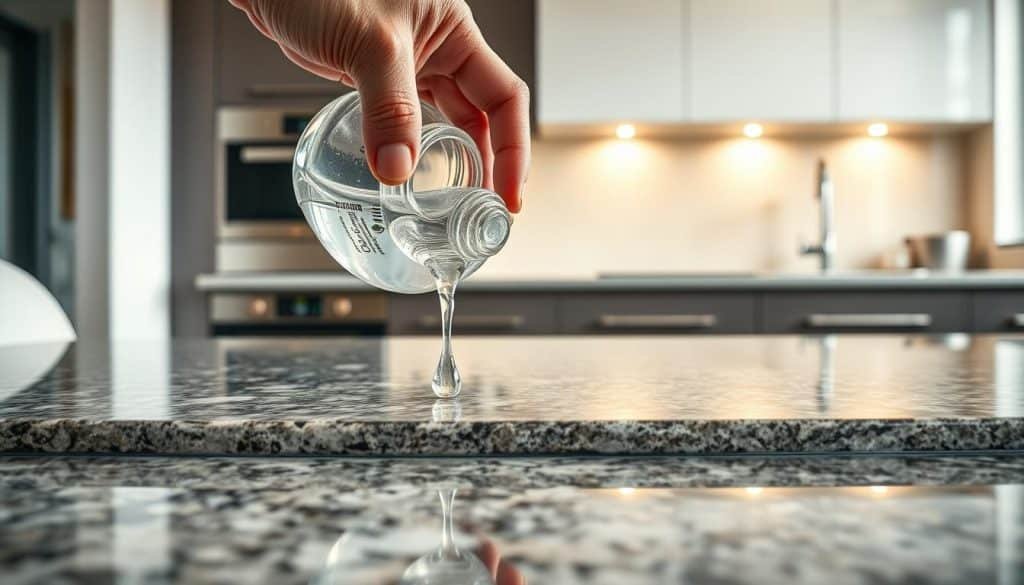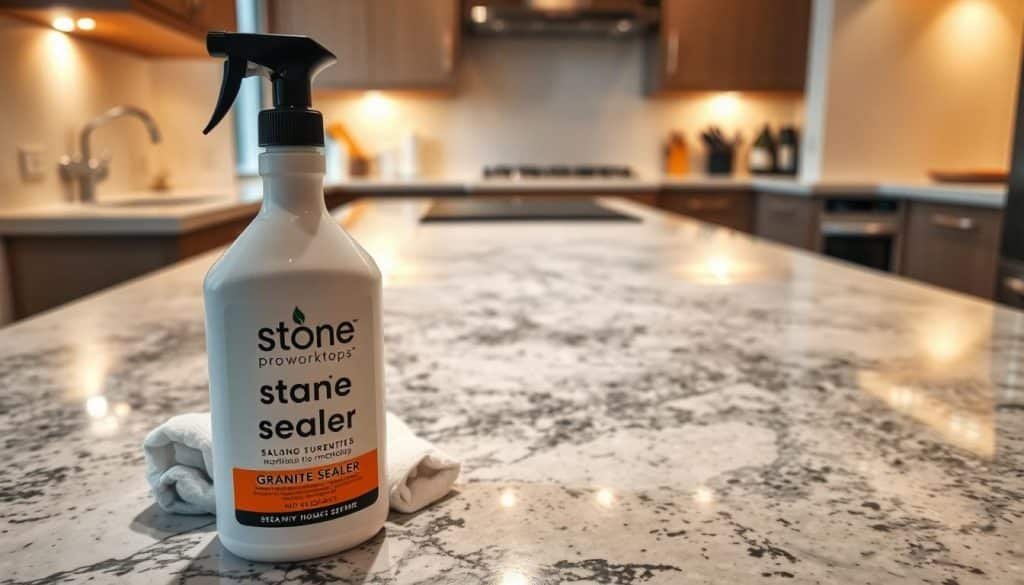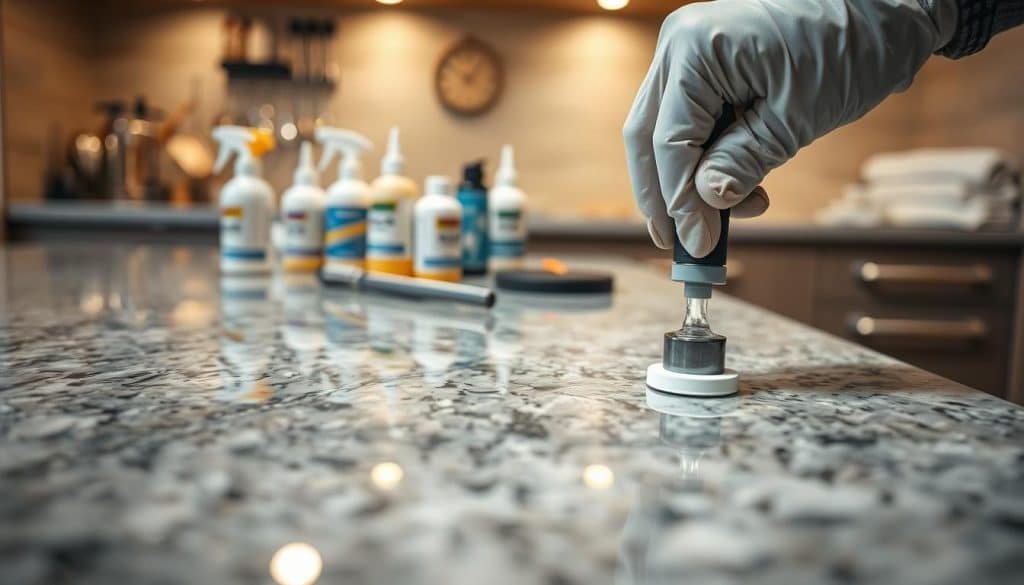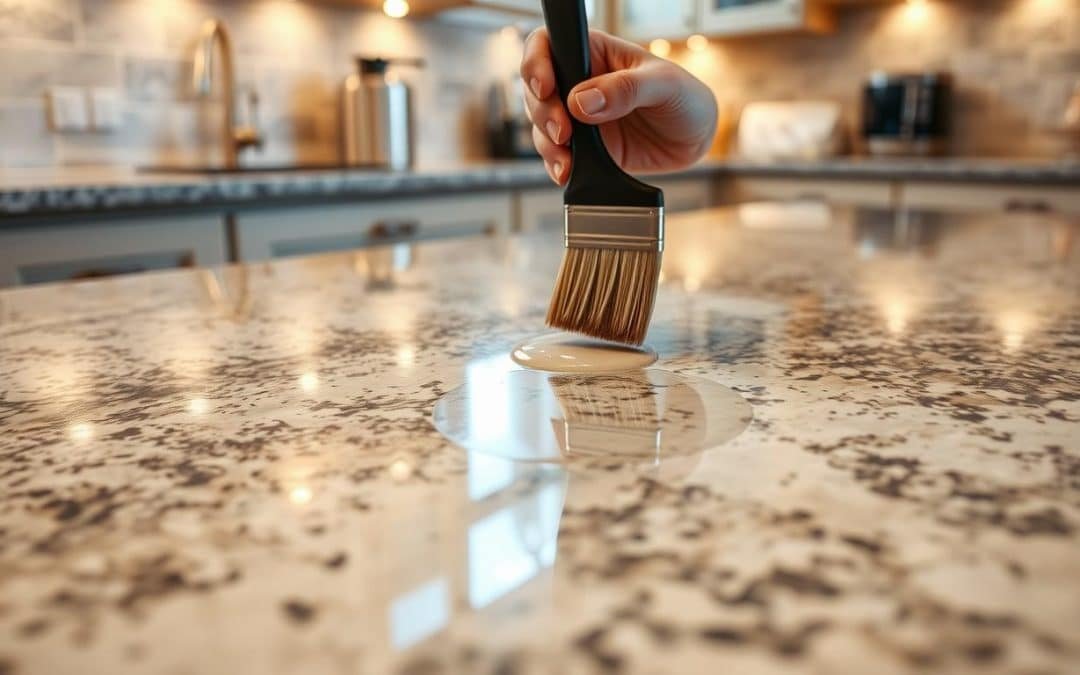Granite worktops are renowned for their durability and aesthetic appeal, making them a popular choice for kitchens and bathrooms. However, their natural beauty and strength come with a need for proper care. Sealing granite worktops is essential to protect them from spills and stains, ensuring they remain a stunning centerpiece in your home.
At StonePro Worktops, we specialise in providing premium sealing services for granite worktops across London. Our team of experts is dedicated to delivering exceptional craftsmanship and personalised service. Whether you’re a homeowner or a designer, we invite you to contact us at info@stoneproworkorktops.co.uk or call us on 07943 204068 for tailored solutions.
Granite, a natural stone, is highly durable but also porous, making it susceptible to damage without proper protection. Sealing your granite worktop creates a protective barrier, safeguarding it against water, oil, and other substances. This process not only maintains the appearance of your worktop but also ensures it lasts for years to come.
Our mission is to provide premium natural stone solutions through expert craftsmanship. We understand the importance of proper care and maintenance, which is why we offer comprehensive guidance on sealing granite worktops. From initial preparation to ongoing maintenance, we are here to ensure your granite worktops remain in pristine condition.
Key Takeaways
- Granite worktops require sealing to protect against spills and stains.
- Sealing enhances durability and maintains the aesthetic appeal of granite.
- Expert guidance is crucial for proper sealing and maintenance.
- StonePro Worktops offers premium sealing services in London.
- Contact us for personalised solutions and exceptional craftsmanship.
Introduction to Granite Worktop Sealing
Granite worktops are a favoured choice for kitchens and bathrooms due to their natural beauty and durability. However, to maintain their appearance and protect against spills,sealing granite worktopsis essential. This process creates a protective barrier, safeguarding your countertop from water, oil, and other substances.
The water test is a simple method to determine if your worktop needs resealing. By sprinkling water on the surface, you can observe how quickly it absorbs. If water soaks in within 5-10 minutes, resealing is necessary. Regular testing ensures your granite countertop remains protected.
Sealing prevents damage from spills and stains, preserving the worktop’s longevity. Our expertise at StonePro Worktops ensures a methodical approach to selecting the correct sealer for different granite types. Whether you’re handling the process yourself or with professional support, we provide step-by-step instructions and technical accuracy for a confident approach.
For more detailed guidance on sealing and maintenance, visit our comprehensive guide: Natural Stone Worktops Sealing Guide
The Importance of Sealing Granite Worktops
Granite, a natural stone, is highly durable but also porous, making it susceptible to damage without proper protection. Sealing your granite worktop creates a protective barrier, safeguarding it against water, oil, and other substances. This process not only maintains the appearance of your worktop but also ensures it lasts for years to come.
Why Seal Your Granite?
Granite’s porous nature means it can absorb spills, leading to stains and potential structural damage. Sealing prevents such issues, ensuring your worktop remains pristine. Our expertise at StonePro Worktops ensures a methodical approach to selecting the correct sealer for different granite types.
Benefits for Longevity and Appearance
Sealing enhances durability and maintains the aesthetic appeal of granite. It simplifies maintenance and is especially beneficial for kitchen worktops, where spills are common. Regular testing, like the water test, helps determine if resealing is needed. Even first-time sealers can follow our guidance with confidence.

Proper sealing enhances both the look and durability of your granite. For tailored solutions, contact us at Paramount Stone in London.
Preparing Your Granite Worktop for Sealing
Proper preparation is crucial before applying a sealer to your granite worktop. This ensures the sealer adheres effectively and provides long-lasting protection.
Thorough Cleaning Techniques
Begin by cleaning the surface using a microfibre cloth and a mild cleaning solution. This removes dust, grease, and residues that could interfere with the sealer. For tougher stains, mix a solution of soap and alcohol, applying it with a fresh cloth to avoid streaks. Regular degreasing ensures the natural stone remains pristine, maintaining its aesthetic appeal.
Conducting a Water Test
To determine if your worktop needs sealing, perform a water test. Sprinkle water on the surface and observe absorption. If it soaks in within 5-10 minutes, resealing is necessary. This simple test helps maintain the worktop’s protective barrier, ensuring it remains resistant to spills and stains.
| Material | Technique | Time |
|---|---|---|
| Microfibre Cloth | Gently wipe the surface | 1-2 minutes |
| Mild Cleaning Solution | Apply and rinse thoroughly | 3-5 minutes |
| Soap/Alcohol Solution | Spot clean tough stains | 1-2 minutes |
| Fresh Cloth | Dry the surface completely | 2-3 minutes |
By following these steps, you ensure your granite worktop is properly prepared for sealing. Our team at StonePro Worktops in London is here to provide expert guidance for a flawless finish. Contact us at info@stoneproworktops.co.uk for tailored solutions.
Choosing the Right Granite Sealer
When it comes to protecting your natural stone surfaces, selecting the appropriate sealer is crucial. With numerous options available, it’s essential to understand the differences and choose a product that aligns with your needs and the specific characteristics of your granite.
Penetrating vs Topical Sealers
Penetrating sealers are absorbed into the stone, offering protection from within by repelling spills and preventing stains. They are ideal for high-traffic areas like kitchen worktops. Topical sealers, on the other hand, form a protective barrier on the surface, enhancing the stone’s appearance while providing a layer of defence against damage. The choice between them often depends on the desired finish and level of protection required.
Selecting Based on Granite Type
Granite varieties vary in porosity and density, influencing the sealer’s effectiveness. For instance, darker granites may benefit more from penetrating sealers to maintain their natural look, while lighter shades might pair well with topical sealers for added sheen. Considering factors like usage patterns and desired aesthetics helps in making an informed decision.
Professional Grade Sealers Explained
Professional-grade sealers offer superior durability and protection compared to standard DIY products. They are formulated to withstand heavy use and provide long-lasting results. For those seeking premium solutions, consulting with experts can ensure the right product is selected for optimal performance and appearance.
For more detailed guidance on sealing and maintaining your granite worktops, visit our comprehensive guide: The Ultimate Guide on How to Seal Granite.

How to Seal Granite Worktop
Sealing your granite worktop is a straightforward process that ensures long-lasting protection. Start by preparing the surface with a microfibre cloth and a mild cleaning solution to remove any dirt or grease. This step is crucial for ensuring the sealer adheres properly.
Once the surface is clean and dry, apply the sealer evenly using a clean, lint-free cloth. Work in small, manageable areas to avoid excess residue. Allow the sealer to absorb for about 10-15 minutes before buffing the surface with a fresh cloth to remove any excess. Repeat this process for a second coat if needed, ensuring each coat is fully absorbed before applying the next.
After applying the sealer, allow the worktop to cure for at least 24 hours before exposing it to water or spills. This curing time is essential for the sealer to fully bond with the granite, providing optimal protection. Regular water tests can help determine if resealing is necessary, ensuring your worktop remains protected.
| Step | Action | Time Required |
|---|---|---|
| 1 | Clean the surface with a microfibre cloth and mild solution | 5 minutes |
| 2 | Apply sealer evenly with a lint-free cloth | 10-15 minutes |
| 3 | Buff the surface to remove excess sealer | 5 minutes |
| 4 | Allow to cure | 24 hours |
For more detailed guidance, visit our comprehensive guide at Affordable Granite. If you have any questions or need professional assistance, contact our team in London at StonePro Worktops.
Detailed Step-by-Step Sealing Process
Sealing your granite worktop is a meticulous process that, when done correctly, ensures lasting protection and maintains its pristine appearance. Whether you’re a first-time sealer or a seasoned homeowner, following these steps will guide you through the process with confidence.
Step 1: Surface Preparation
Begin by thoroughly cleaning the surface using a microfibre cloth and a mild cleaning solution. This step removes dirt, grease, and residues that could interfere with the sealer. For tougher stains, a mixture of soap and alcohol can be applied with a fresh cloth to avoid streaks. Always degrease regularly to keep your worktop pristine.
Next, perform the water test by sprinkling droplets on the surface. If the water absorbs within 5-10 minutes, your worktop is ready for sealing. This simple test ensures the protective barrier remains effective against spills and stains.
Step 2: Application of Sealant
Using a lint-free cloth, apply the sealant evenly across the worktop, working in small sections to avoid excess residue. Ensure every area receives proper coverage for consistent protection. Allow the sealant to absorb for about 10-15 minutes before moving to the next step.
Step 3: Buffing and Curing
Buff the surface with a fresh, clean cloth to remove any excess sealant, achieving a streak-free finish. After buffing, let the worktop cure for at least 24 hours before exposing it to water or spills. This curing time is crucial for the sealer to fully bond with the granite, providing optimal protection.
After curing, perform another water test to confirm the seal’s success. For more detailed guidance, visit WikiHow’s guide on sealing granite countertops.
“A well-sealed granite worktop is not just protected; it’s preserved in its natural beauty for years to come.”
At StonePro Worktops in London, we emphasize quality craftsmanship and precision. Contact us at info@stoneproworktops.co.uk for tailored solutions and expert guidance.

Post-Sealing Maintenance and Care
After sealing your granite worktop, regular maintenance is crucial to preserve its beauty and functionality. Proper care ensures the sealer remains effective, protecting your worktop from spills and stains while maintaining its aesthetic appeal.
Daily Cleaning Tips
For daily upkeep, use a mild detergent mixed with water and a soft, non-abrasive cloth. Avoid harsh chemicals, as they can damage the sealer. Regular cleaning prevents the buildup of residue and maintains the worktop’s polished finish.
For tougher stains, apply a solution of soap and alcohol with a clean cloth. Avoid using abrasive materials that could scratch the surface. Regular degreasing is essential, especially in high-traffic kitchen areas.
When to Reseal Your Worktop
Perform the water test periodically to check if your worktop still repels moisture. If water absorbs quickly, it’s time to reseal. Typically, resealing is needed every 12-18 months, depending on usage patterns.
Immediate attention to spills is crucial. Address them promptly to prevent stains from setting in. Consistent daily care extends the life of the sealer and preserves the worktop’s appearance.
| Maintenance Task | Frequency | Time Required |
|---|---|---|
| Daily Cleaning | After each use | 5 minutes |
| Water Test | Every 6-12 months | 2 minutes |
| Resealing | Every 12-18 months | 30 minutes |
For more detailed guidance on maintaining your granite worktop, visit our comprehensive guide: Granite Worktops Care and Maintenance.
At StonePro Worktops in London, we emphasize the importance of consistent post-sealing care. Contact us at info@stoneproworktops.co.uk for tailored solutions and expert guidance. Regular maintenance ensures your granite worktop remains a stunning and functional centerpiece in your kitchen for years to come.
Tips for Troubleshooting and Testing Your Seal
Ensuring your granite countertop remains protected involves more than just applying a sealer. Proper testing and troubleshooting are essential to maintain its integrity. At StonePro Worktops, we guide you through the process with expertise and care.
Performing the Water Test
To determine if your granite needs resealing, perform the water test. Sprinkle a few drops on the surface. If absorption occurs within 5-10 minutes, resealing is necessary. This simple test ensures your countertop stays protected against spills and stains, preserving its appearance and functionality.
Strategies for Resolving Common Issues
Common issues after sealing include uneven absorption or residue. For uneven areas, reapply sealer with a lint-free cloth, buffing gently. To remove residue, use a clean cloth without excess sealer. Always use microfibre cloths to avoid scratches and maintain the finish. Regular testing and timely maintenance prevent larger problems, ensuring your granite remains in pristine condition.
For tailored solutions and expert guidance, contact our team in London at info@stoneproworktops.co.uk. Regular care ensures your granite countertop remains a stunning and functional centerpiece in your kitchen for years to come.
Conclusion
Proper sealing is essential to protect and preserve the natural elegance of your granite worktop. By following the step-by-step process outlined in this guide, from preparation and application to maintenance and troubleshooting, you can ensure your granite countertop remains a stunning and functional centerpiece in your kitchen for years to come.
Regular testing, such as the water test, helps determine if resealing is necessary, while consistent daily care extends the life of the sealer. For those uncertain about the process, consulting a professional can provide peace of mind and ensure optimal results. At StonePro Worktops in London, we specialise in providing premium natural stone solutions, offering expert guidance and tailored services to meet your needs.
For more information on when your granite worktop needs sealing, visit Granite Direct. Explore our range of high-quality kitchen worktops at StonePro Worktops and discover how we can enhance your home with expert craftsmanship.
Contact us at info@stoneproworktops.co.uk or call us on 07943 204068 for personalised solutions and exceptional service. With our expertise, sealing your granite worktop becomes an accessible and rewarding process, ensuring your investment remains protected and preserved for years to come.

